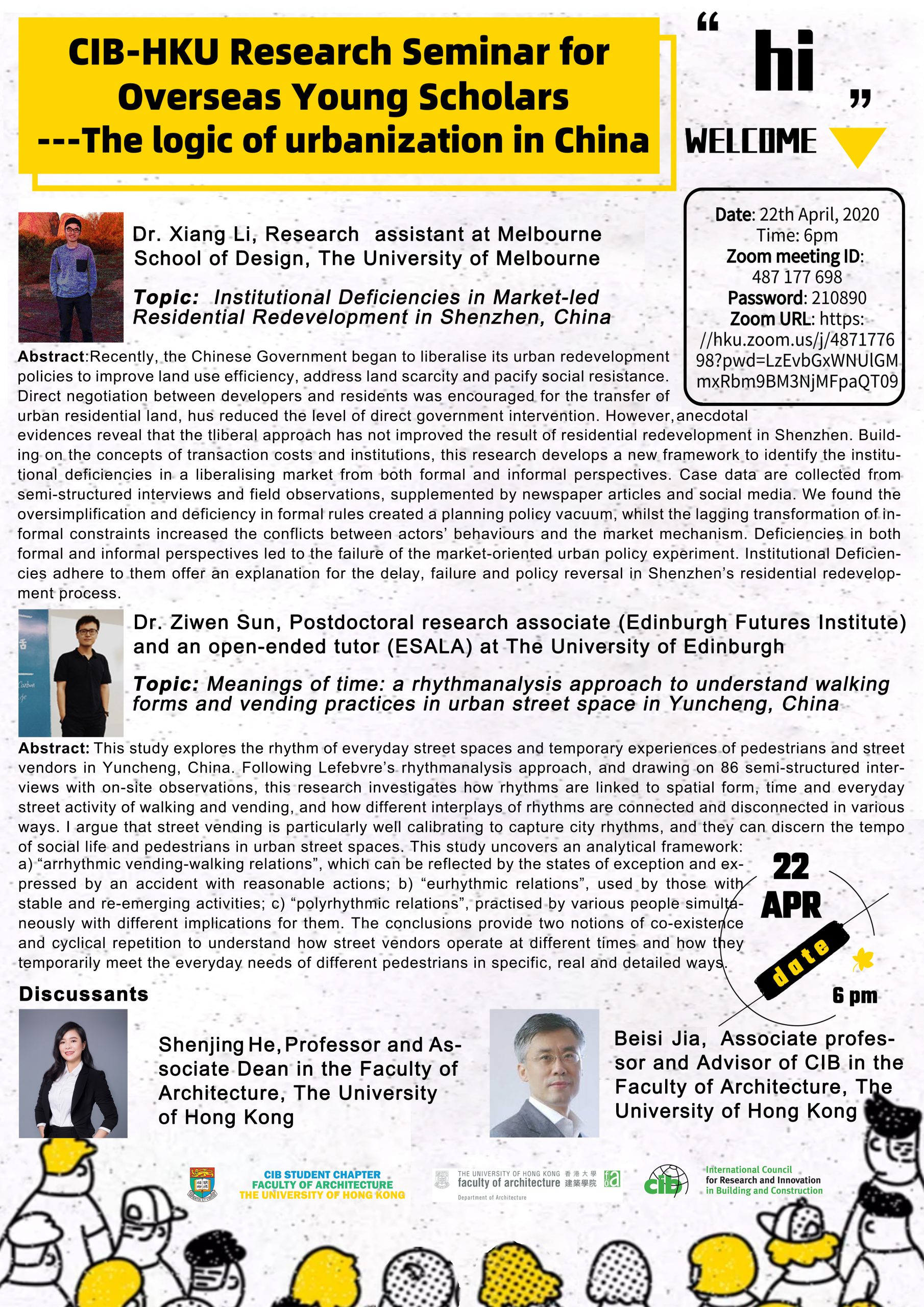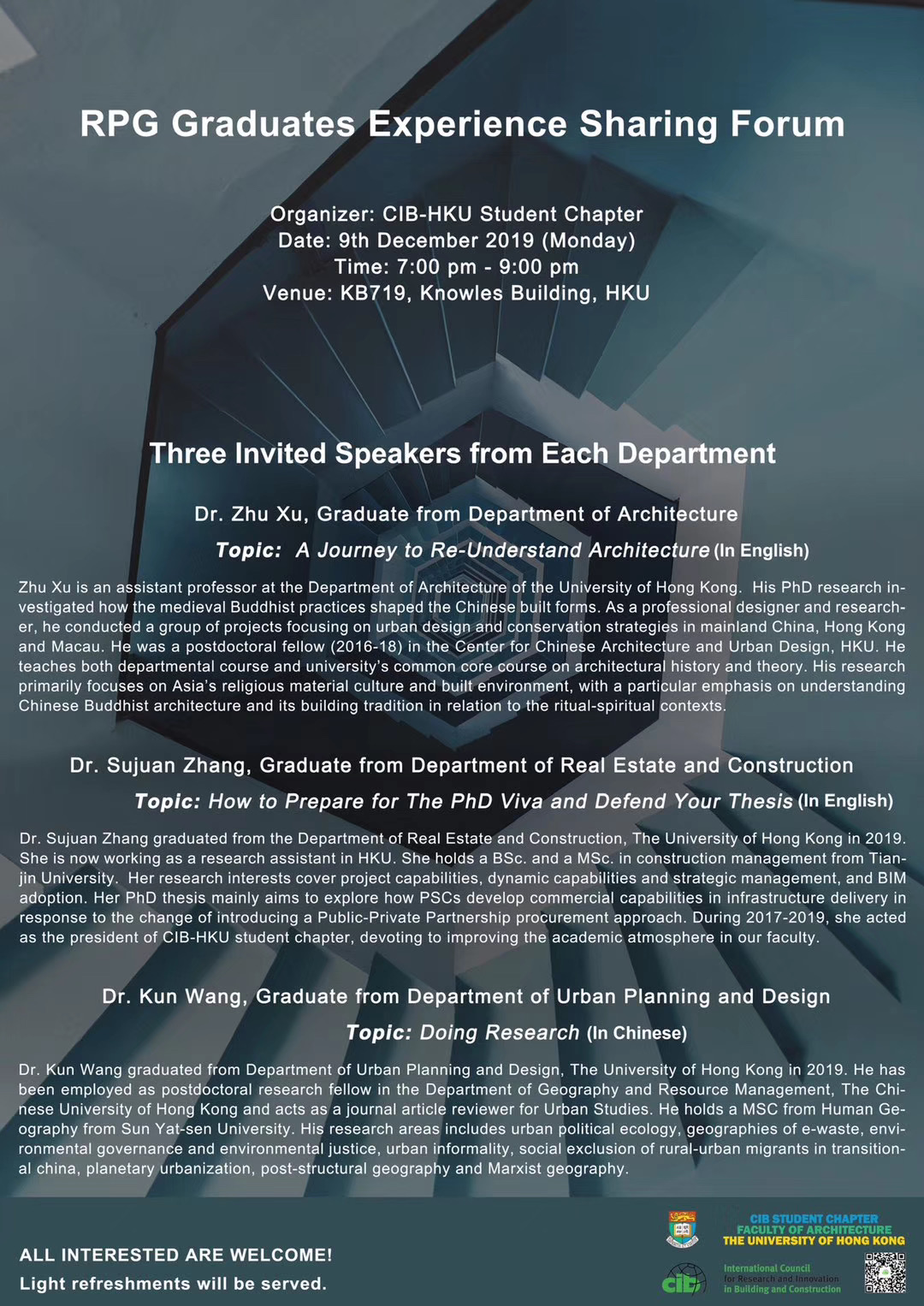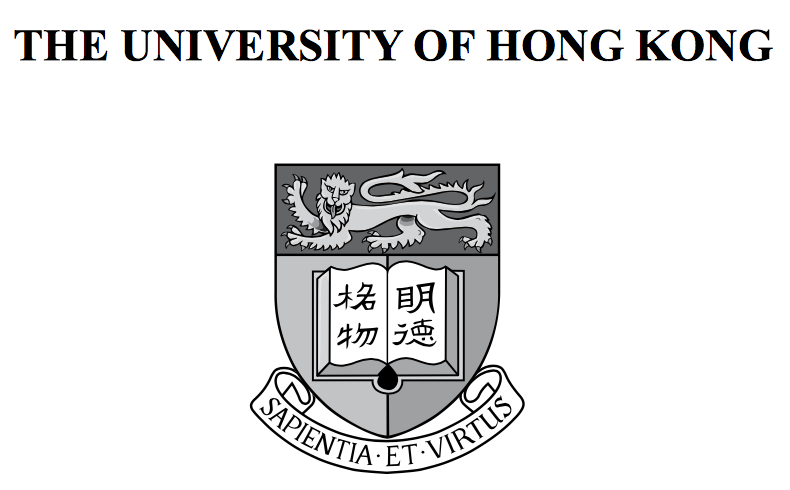Message from CIB-HKU Student Chapter, Faculty of Architecture, HKU
The CIB-HKU Student Chapter is pleased to invite you to attend our Online Research Forum on 22nd April (Wednesday) 2020 as follows:
Theme: The Logic of Urbanization in China
Schedule:
Date: 22 April 2020 (Wednesday)
Time: 18:00-19:30
ZOOM Meeting ID: 487 177 698
Password: 210890
ZOOM Link: https://hku.zoom.us/j/487177698?pwd=LzEvbGxWNUlGMmxRbm9BM3NjMFpaQT09
Forum program:
- 18:00-18:10 Welcome address
- 18:10-18:40 Topic 1 – Institutional Deficiencies in Market-led Residential Redevelopment in Shenzhen, China
(Dr Xiang Li, Research assistant at Melbourne School of Design, The University of Melbourne)
- 18:40-19:10 Topic 2 – Meanings of time: a rhythmanalysis approach to understand walking forms and vending practices in urban street space in Yuncheng, China
(Dr. Ziwen Sun, Postdoctoral research associate (Edinburgh Futures Institute) and an open-ended tutor (ESALA) at The University of Edinburgh)
- 19:10-19:30 Discussion (Dr. Shenjing He& Dr. Beisi Jia)
Speaker Introduction:

- Lecturer: Dr. Xiang Li,Research assistant at Melbourne School of Design, The University of Melbourne
Title: Institutional Deficiencies in Market-led Residential Redevelopment in Shenzhen, China
Abstract:
Recently, the Chinese Government began to liberalise its urban redevelopment policies to improve land use efficiency, address land scarcity and pacify social resistance. Direct negotiation between developers and residents was encouraged for the transfer of urban residential land, thus reduced the level of direct government intervention. However, anecdotal evidences reveal that the liberal approach has not improved the result of residential redevelopment in Shenzhen. Building on the concepts of transaction costs and institutions, this research develops a new framework to identify the institutional deficiencies in a liberalising market from both formal and informal perspectives. Case data are collected from semi-structured interviews and field observations, supplemented by newspaper articles and social media. We found the oversimplification and deficiency in formal rules created a planning policy vacuum, whilst the lagging transformation of informal constraints increased the conflicts between actors’ behaviours and the market mechanism. Deficiencies in both formal and informal perspectives led to the failure of the market-oriented urban policy experiment. Institutional Deficiencies adhere to them offer an explanation for the delay, failure and policy reversal in Shenzhen’s residential redevelopment process.
About the speaker:
Dr Xiang Li fulfilled his PhD requirement in January 2020 and currently work as a research assistant at the University of Melbourne. His PhD research investigates the impact of participatory urban redevelopment policies on power relations among different stakeholders in Shenzhen, China. He has broad research interests in urban politics, policy mobility, urban redevelopment and neoliberalism, with publications in leading journals. His teaching portfolio, with an emphasis on urban planning and design, focuses on healthy cities, urban resilience and sustainability.

- Lecturer: Dr. Ziwen Sun, Postdoctoral research associate (Edinburgh Futures Institute) and an open-ended tutor (ESALA) at The University of Edinburgh
Title: Meanings of time: a rhythmanalysis approach to understand walking forms and vending practices in urban street space in Yuncheng, China
Abstract:
This study explores the rhythm of everyday street spaces and temporary experiences of pedestrians and street vendors in Yuncheng, China. Following Lefebvre’s rhythmanalysis approach, and drawing on 86 semi-structured interviews with on-site observations, this research investigates how rhythms are linked to spatial form, time and everyday street activity of walking and vending, and how different interplays of rhythms are connected and disconnected in various ways. I argue that street vending is particularly well calibrating to capture city rhythms, and they can discern the tempo of social life and pedestrians in urban street spaces. This study uncovers an analytical framework: a) “arrhythmic vending-walking relations”, vending-walking which can be reflected by the states of exception and expressed by an accident with reasonable actions; b) “eurhythmic relations”, used by those with stable and re-emerging activities; c) “polyrhythmic relations”, practised by various people simultaneously with different implications for them. The conclusions provide two notions of co-existence and cyclical repetition to understand how street vendors operate at different times and how they temporarily meet the everyday needs of different pedestrians in specific, real and detailed ways.
About the speaker:
Dr Ziwen Sun is a postdoctoral research associate (Edinburgh Futures Institute) and an open-ended tutor (ESALA) at the University of Edinburgh. His interests lie in the intersection of spatial forms and “social life” in Chinese cities. His PhD study, “Chinese Walking Urbanism”, brings together spatial theories with empirical evidence. To see walkable space and walking behaviours through the perspective of street vending is to see it with lateral vision, to understand how seemingly separate phenomena are connected. He is also teaching architecture/landscape studios and supervising postgraduate dissertations. He has attained recognition as a Fellow of the Higher Education Academy and an Associate of the Royal Incorporation of Architects in Scotland.
Discussant Introduction:

Professor Shenjing He is Associate Dean in the Faculty of Architecture at the University of Hong Kong.

Dr. Beisi Jia is Associate professor in the Faculty of Architecture at the University of Hong Kong and the advisor of CIB.







